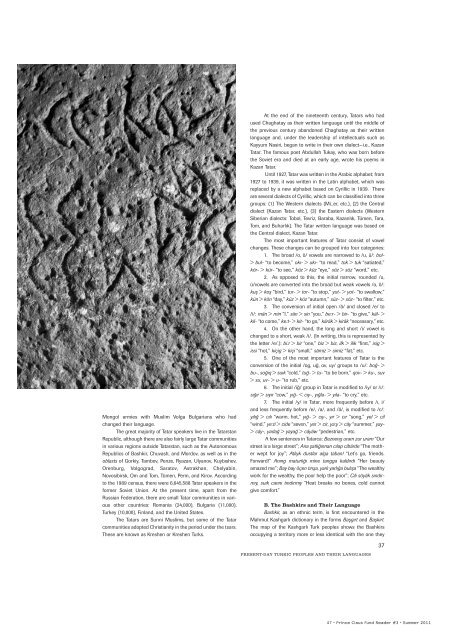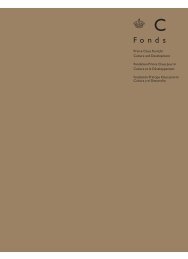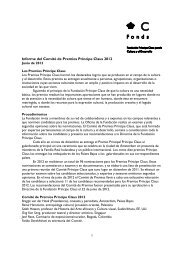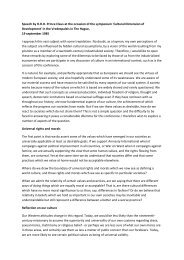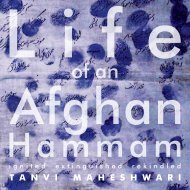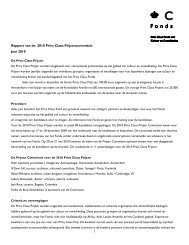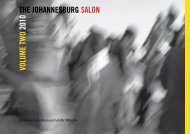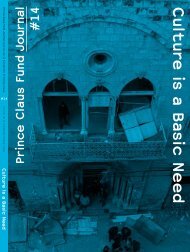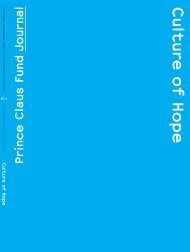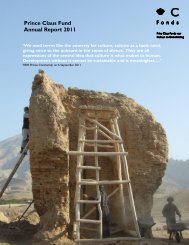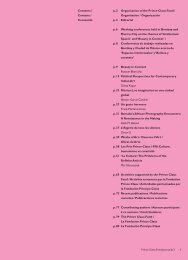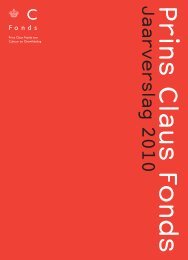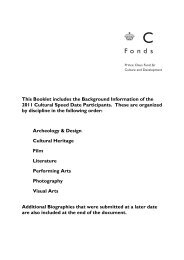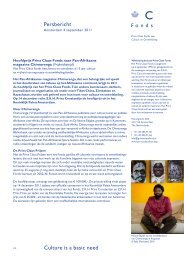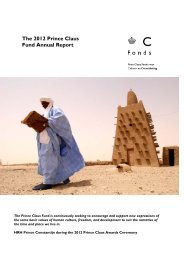030–053talattekin_alt:turklergaram 29.11.2007 9:21 Uhr Seite 36berk uruldı “The foundations of the building were securely laid”;Zala münge golay a:dam sığya:r “The salon can accommodateup to a thousand”; Acala pul tölä:p gutulıp bilmez “No one canescape death by paying money”; U:kısızlık zera:rlı kellä:mağralıpdır “My head is heavy through lack of sleep.”D. The Gagauz and Their LanguageThe Orthodox Christian Gagauz probably derived theirname from Seljuk Sultan Keykavus II, who is said to have sentseveral thousand men to the Balkans in the mid-thirteenth centuryat the request of the Byzantine Emperor Mihail Paleologosto prevent the Slav raids on the Byzantine Empire. These Seljuktroops adopted Christianity under the influence of the Slav people.In the course of time, the Gagauz—who had adoptedChristianity in this Slav environment—mingled with theBulgarians, Romanians, and other ethnic groups in the region.Today, the Gagauz form a Christian community inhabitingthe southern section of the Republic of Moldova andOdessa Province in Ukraine. The Gagauz emigrated from northeasternBulgaria to this area—formerly known as Bessarabia—at the end of the eighteenth century and the beginning of thenineteenth. The 1989 census gives the number of Gagauz livingin the former Soviet Union as 197,164. Apart from the populationin Moldova, there are 5,000 Gagauz in Bulgaria. InUkraine and Kazakhstan and other parts of Central Asia, thereare small Gagauz communities that migrated there between1908 and 1914. The total number of Gagauz thus amounts tomore than 200,000. The Gagauz had no official script until 1957,when the High Council of the Moldavian SSR drew up a newalphabet of Gagauz Turkish. It was based mainly on Cyrillic, withthe letters /ö, ü, ä/ from the Latin (German) alphabet.Nowadays, there are two dialects of Gagauz Turkish spoken inMoldova and Ukraine: (1) The Central (or Chad›rlung-Komrat)dialect, (2) the South (or Vulkaneflt) dialect. The written languageis based on the Central dialect. Soviet Turcologists suchas N. A. Baskakov and L. A. Pokrovskaya regard Gagauz Turkishas a separate language, but, according to the distinguishedGerman Turcologist Gerhard Doerfer, Gagauz is very close toTurkish. We share this view and classify Gagauz Turkish as oneof the Rumelian Turkish dialects. The characteristic features ofGagauz Turkish may be listed as follows:1. The narrowing of initial /o/ and /ö/ to /u/ and /ü/:boğaz > buaz, doğ- > du:-, soğan > suan, yoğurt > yu:rt, böğrek> bü:rek “kidney,” göğüs > gü:s, öğren- > ü:ren-, ögsüz > ü:süz“orphan,” söğüt > sü:t, söyün- > sü:n- “to be extinguished,”öğey > üvä “step,” etc.2. The y- prothesis of a /y/ sound in front of wordsbeginning with /e/: ek- > yek- “bread,” el > yel “foreigner,” eri-> yeri- “to melt,” ertesi > yertesi, eski > yeski, esir > yesir, ev >yev, etc. This prothesis of /y/ can also be seen in words beginningwith /i, ›/: iftira > yıftıra, insan > yınsan, ısla- > yısla-, ısın-> yısın-, etc. There are also cases of the disappearance of the/h/ consonant at the beginning of a word: > yesap, hepisi >yepisi “all,” etc.3. The loss of /h/ at the beginning of a word: hafta >afta, hakikat > akikat, hani > ani, haçan > açan “when,” hangı >angı “which,” hava > ava, etc.4. The disappearance of /y/ at the beginning of a word.36LANGUAGE AND IDENTITYThis usually occurs in front of /ü/: yügsek > ü:sek “high,” yügsük> ü:sük “thimble,” yük > ük, yürek > ürek, yüz > üz “face,” yüz> üz “one hundred,” yüz- > üz-, yüzük > üzük, etc.One of the most important features of Gagauz Turkish isfound in the syntax. As a result of the several centuries of coexistenceof the Gagauz and the Slavs (Bulgarians), Gagauz brokeaway from Turkish syntax and became wholly Slavic. The followingare a few examples: pa:sı bu fistanın “the price of thisdress,” yaprakları kiyadın “pages of the book,” Di:l lä:zım “It isn’tnecessary,” Lä:zım lafedeyim “I have to talk,” Annader cenk için“He is talking about the war,” Uşak çek etti a:lama “The childbegan to cry,” Laflanmışlar gitmä “They agreed to go.”Compound sentences formed by relative pronouns such asnicä “how,” ani “where,” neçinki “because,” etc., have a convertedsyntax: Yoktu nicä gitsinnär “They couldn’t go”; Bizgördük, ani yavaş işlemektän var nicä ge:ri kalalım “We saw thatby working slowly we would fall behind”; Tutunduk yeniycä işä,neçinki yeskiycesinä bü:n yok nasıl yaşama “As we realized thatwe couldn’t go on as before, we set to work again.”II. KIPCHAK GROUPThe Kipchak group, as we have seen, comprises severallanguages and dialects. These can be classified in accordancewith the position of the/o/ vowel and initial /s/ sound. Takingthe verb koş- “run, add” as an example of a verb containingboth sounds, we may classify these subgroups as follows: (1)kuş- subgroup (Tatar, Bashkir), (2) kos- subgroup (Kazakh,Nogay, Karakalpak), (3) koş- subgroup (Kumuk, Karachay-Balkar, Crimean Tatar, Karay or Karayim).The Kipchak group of Turkic languages comprises thefollowing languages and dialects: Tatar, Baflkurt; Kazakh,Karakalpak, Nogay; Kumuk, Karachay-Balkar, Crimean Tatarca,Karay or Karayim. A general characteristic feature of this groupis the conversion of the /d/ sound in Old Turkic (as in the Oghuzgroup) into /y/, initial /a€/ group into /aw/, and the disappearance(again as in the Oghuz group) of the /g/ sound at the endof polysyllabic words: adak > ayak, tod- > toy- “to become satiated,”tağ > taw “mountain,” tağlığ > tawlı “mountaineer,” sa:rığ> sarı, ti:rig > tiri “alive,” etc.A. The Tatars and Their LanguageThe word Tatar as an ethnic term is first encountered inthe Orkhon inscriptions in the forms Tatar and Tokuz Tatar, butthe names in these inscriptions are very probably the names ofMongolian-speaking tribes, not Turkic-speaking ones.The name Tatar is found in the famous dictionary of MahmutKashgarl›. In the map of the Turkic peoples in the Kashgarl›work, the Tatars, together with the Bashkirs, are shown asoccupying a region north of the Caspian Sea, northeast of theBulgarian Turks, in the Idil-Ural region inhabited by the Tatarstoday. The emergence of the Turkic-speaking Tatars under theirown name coincides with the era of the Golden Horde. Finally,in the Codex Cumanicus, the language of the Kipchak Turkictexts is named Tatarja or Tatar til. In the Golden Horde state, theMongols were in the minority; the majority consisted of KipchakTurks. The region also contained an urban population ofBulgarian Turks. The present-day Tatars are probably descendantsof a mixture of the Kipchak and Mongol tribes in theYenisei inscriptions,sixth century, MinusinskMuseum, Minusinsk,Russia (cf. pp. 30, 32, 34).<strong>Prince</strong> <strong>Claus</strong> <strong>Fund</strong> Reader #1 · Summer <strong>2011</strong> · 46
030–053talattekin_alt:turklergaram 29.11.2007 9:21 Uhr Seite 37Mongol armies with Muslim Volga Bulgarians who hadchanged their language.The great majority of Tatar speakers live in the TatarstanRepublic, although there are also fairly large Tatar communitiesin various regions outside Tatarstan, such as the AutonomousRepublics of Bashkir, Chuvash, and Mordov, as well as in theoblasts of Gorkiy, Tambov, Penze, Ryazan, Ulyanov, Kuyb›shev,Orenburg, Volgograd, Saratov, Astrakhan, Chelyabin,Novosibirsk, Om and Tom, Tümen, Perm, and Kirov. Accordingto the 1989 census, there were 6,645,588 Tatar speakers in theformer Soviet Union. At the present time, apart from theRussian Federation, there are small Tatar communities in variousother countries: Romania (24,000), Bulgaria (11,000),Turkey (10,000), Finland, and the United States.The Tatars are Sunni Muslims, but some of the Tatarcommunities adopted Christianity in the period under the tsars.These are known as Kreshen or Kreshen Turks.At the end of the nineteenth century, Tatars who hadused Chaghatay as their written language until the middle ofthe previous century abandoned Chaghatay as their writtenlanguage and, under the leadership of intellectuals such asKayyum Nasiri, began to write in their own dialect—i.e., KazanTatar. The famous poet Abdullah Tukay, who was born beforethe Soviet era and died at an early age, wrote his poems inKazan Tatar.Until 1927, Tatar was written in the Arabic alphabet; from1927 to 1939, it was written in the Latin alphabet, which wasreplaced by a new alphabet based on Cyrillic in 1939. Thereare several dialects of Cyrillic, which can be classified into threegroups: (1) The Western dialects (Mi_er, etc.), (2) the Centraldialect (Kazan Tatar, etc.), (3) the Eastern dialects (WesternSiberian dialects: Tobol, Tevriz, Baraba, Kazanl›k, Tümen, Tara,Tom, and Buharl›k). The Tatar written language was based onthe Central dialect, Kazan Tatar.The most important features of Tatar consist of vowelchanges. These changes can be grouped into four categories:1. The broad /o, ö/ vowels are narrowed to /u, ü/: bol-> bul- “to become,” okı- > ukı- “to read,” tok > tuk “satiated,”kör- > kür- “to see,” köz > küz “eye,” söz > süz “word,” etc.2. As opposed to this, the initial narrow, rounded /u,ü/vowels are converted into the broad but weak vowels /o, ö/:kuş > koş “bird,” tur- > tor- “to stop,” yut- > yot- “to swallow,”kün > kön “day,” küz > köz “autumn,” süz- > söz- “to filter,” etc.3. The conversion of initial open /ä/ and closed /e/ to/i/: män > min “I,” sän > sin “you,” be:r- > bir- “to give,” käl- >kil- “to come,” ke:t- > kit- “to go,” käräk > kiräk “necessary,” etc.4. On the other hand, the long and short /i/ vowel ischanged to a short, weak /i/. (In writing, this is represented bythe letter /e/.): bi:r > bir “one,” biz > biz, ilk > ilik “first,” isig >issi “hot,” kiçig > kiçi “small,” sämiz > simiz “fat,” etc.5. One of the most important features of Tatar is theconversion of the initial /og, u€, ov, uy/ groups to /u/: boğ- >bu-, soğıq > suık “cold,” tuğ- > tu- “to be born,” qov- > ku-, suv> su, uv- > u- “to rub,” etc.6. The initial /i€/ group in Tatar is modified to /iy/ or /›/:sığır > sıyır “cow,” yığ- < cıy-, yığla- > yıla- “to cry,” etc.7. The initial /y/ in Tatar, more frequently before /›, i/and less frequently before /e/, /a/, and /ä/, is modified to /c/:yılığ > cılı “warm, hot,” yığ- > cıy-, yır > cır “song,” yel > cil“wind,” ye:ti > cide “seven,” yer > cir, ya:y > cäy “<strong>summer</strong>,” yay-> cäy-, yadağ > yayağ > cäyäw “pedestrian,” etc.A few sentences in Tatarca: Bezneng uram zur uram “Ourstreet is a large street”; Ana şatlığınnan cılap cibärde “The motherwept for joy”; Atlıyk dustlar alga taban! “Let’s go, friends.Forward!” Anıng maturlığı mine tangga kaldırdı “Her beautyamazed me”; Bay bay öçen tırışa, yarlı yarlığa bulışa “The wealthywork for the wealthy, the poor help the poor”; Cılı söyäk sındırmıy,suık cannı tındırmıy “Heat breaks no bones, cold cannotgive comfort.”B. The Bashkirs and Their LanguageBashkir, as an ethnic term, is first encountered in theMahmut Kashgarl› dictionary in the forms Başgırt and Başkırt.The map of the Kashgarl› Turk peoples shows the Bashkirsoccupying a territory more or less identical with the one theyPRESENT-DAY TURKIC PEOPLES AND THEIR LANGUAGES3747 · <strong>Prince</strong> <strong>Claus</strong> <strong>Fund</strong> Reader #3 · Summer <strong>2011</strong>


